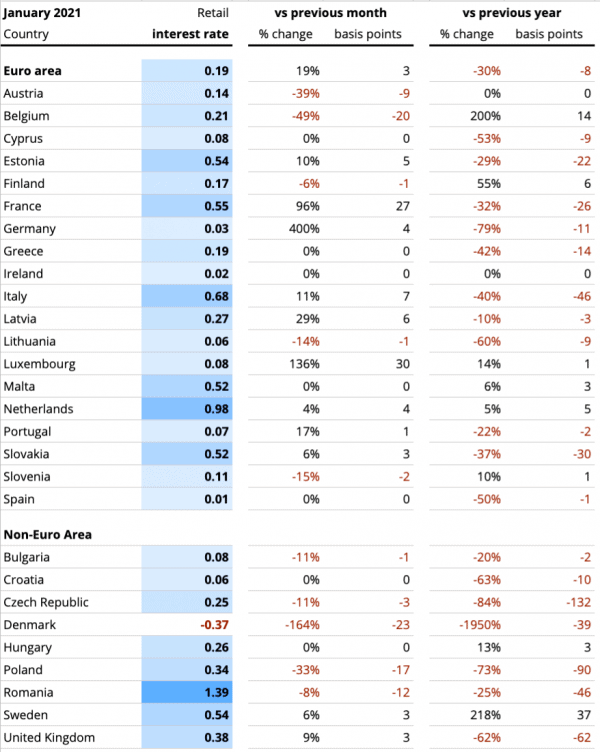Raisin, an interesting Fintech that allows users to surf savings rates and pick the best to generate more income with their money, is distributing an Interest Rate Tracker for the European Market. Raising notes that according to the latest European Central Bank data the Eurozone’s biggest economy Germany has pulled back above zero, from its average retail rate last month of -0.01%, along with an overall uptick in average European interest rates.
That being said, since the start of the pandemic interest at the biggest banks has fallen steadily and top rates across Europe have dropped up to 50% from where they were in March 2020, even while savings volume grows.
Raisin reports that Eurozone savers have a record €5 trillion parked just in overnight and current accounts.
Raisin adds that since March 2020, the largest banks in all but one of the European countries where they track interest rates have lowered interest rates, with Belgium the only exception. The last several months, since lockdowns returned across Europe, have seen regular downward movement.
 Katharina Lueth, Raisin banking expert, VP Europe, and Chair of Raisin UK, states:
Katharina Lueth, Raisin banking expert, VP Europe, and Chair of Raisin UK, states:
“In every country we survey (again, except Belgium) the highest available interest rates also fell since March 2020, losing up to 50% of their value in some cases over the last year, with Norway, Poland, and France hardest hit. In the bulk of Western Europe and the UK, top offers on average slipped fractionally even since last month.”
Lueth says that all-time low interest at the largest banks across Europe bode poorly for European depositors.
“Low-interest rates along with economic uncertainty have pushed consumers away from investing in term deposits. The high volume of cash at big banks is, in turn, costing banks at the ECB, where they must pay interest on their liquidity overhang. It’s also getting increasingly passed on to customers and is connected to stagnation in other parts of the market.”
So the story is rather grim as parking your money in a bank account provides security but little more. As there is always a hunt for yield, perhaps it is time that Raisin offers a broader portfolio of investment alternatives beyond accounts that generate negative real returns.


